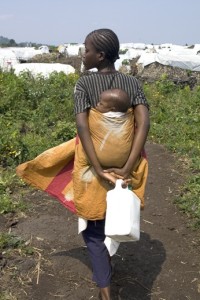Seeing through the smoke: the right to survive a disaster

We spent Saturday at our house burning the branches and trunk chunks from a giant pine that a pair of spider-like tree guys, with spikes on their boots, had cut down for us. We were afraid a strong wind off the river would send the old tree crashing onto our house. So, we beat the wind to it.
It took all day to burn the tangle of boughs. And as each sap-soaked armful exploded into flame, the orange and gray smoke boiling above it, I thought about some of the women I had met in Ethiopia last summer.
They were trying to survive a drought that had wiped out their crops and killed their animals, leaving them with little to eat. Loko Dadacha’s family was down to one meal a day—a government-supplied ration of wheat boiled in water. With few options for earning money, she spent hours scavenging for wood to sell, as did many of the women, hauling their heavy loads home on empty stomachs.
But for all the energy she poured into the enterprise, Loko’s reward was only about 10 cents a bundle. How much food for her family would that buy?
As we burned through our pile of nuisance wood, the wasted heat chapping our cheeks, I kept seeing Loko’s bundles—her survival bundles, hacked into firewood length with the heavy, dull ax she carries as naturally as a baby on her back. It was another one of those moments—an all-day moment, this time—where the imbalance in our world hung as heavy and stinging as the smoke in the air.
And it makes me think now of a statistic I just read in a new Oxfam report called The Right to Survive: In rich countries, the average number of deaths per disaster is 23, while in the poorest countries, the average is 1,052. The report is loaded with numbers like that, numbers that hammer at inequalities that I can hardly begin to fathom—like the fact that in 2007, nearly 60 percent of the people in sprawling Congo didn’t have access to safe drinking water and half of them had no access to medical services; or that in sub-Saharan Africa one out of three people don’t have enough to eat; or that in 2006 the world spent more on video games than it did on international humanitarian assistance.
The scar the burn pile left in our yard will probably be there for a long time—a daily reminder to me of Loko and millions more like her. I welcome that reminder.